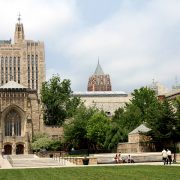Every student wants to know the magical formula that will get them accepted at Harvard – or Stanford, Yale, Columbia, Princeton, MIT, Brown, Dartmouth, or any of several other highly selective colleges.
If I could just create a detailed checklist that would ensure your acceptance at one of these schools, I would. But I can’t. Such a checklist simply doesn’t exist (even if WikiHow has given you fourteen simple steps to a Harvard admission letter).
A typical Harvard admission checklist correctly notes the importance of grades, course rigor, SAT/ACT scores, supplementary test scores like AP exams, and extracurricular activities. But if these were the only ingredients to college admission, wouldn’t every student with a 4.0 GPA in AP courses and a 1590 on the SAT get into Harvard?
Of course your grades and test scores have to be stellar just to get past the first round of cuts. When you’re applying at a school that only accepts about 1 in 15 students, your grades, test scores, and course choices have to be the best of the best. But – and I’m sorry to be the bearer of bad news – a 4.0 and high SAT scores probably won’t be enough.
The Atlantic recently published a piece called “How to Get Into Harvard,” in which Harvard President Drew Gilpin is quoted as saying, “We could fill our class twice over with valedictorians.” At a college like that – a school that is free to choose from among the best and brightest students in the world – the difference between a hefty admissions packet and a slim rejection letter is a lot less tangible: Personality.
When you’re applying to a school where almost all of the other 30,000 applicants have equally good grades and test scores, it’s the intangible factors – your essay, your recommendations, and what you’ve done with your time – that are going to make the biggest difference.
The bad news is that it’s a lot easier to check off items on a list – no matter how challenging the list may be – than it is to achieve some intangible goal like “Be Interesting” (although WikiHow offers 8 simple steps to be more interesting, too). The good news is that this advice should be a call for students to focus on developing their passions and interests rather than just creating a resume.
So, since everyone loves a checklist, here is a list of tips to add personality to your college applications:
Discover Your Bliss: Colleges — Harvard or not — want to see that you have passion and that you pursue your interests. So it’s probably important to, well, have passions and interests. Stop worrying about whether college admission officers will be impressed by the things you’re interested in and just go for it. You like video games? Great. Nothing gets you more excited than the new spring fashion line? Okay. Your voice enters ranges not audible by humans when you see puppies? Cool. It doesn’t matter what you’re passionate about, as long as you’re passionate about something.
Follow Your Bliss: Okay, now you’ve got a passion. That’s still not enough — you have to do something with your passion. You’re a gamer? Blog about it, start a gamer club, develop your own video games. You love fashion? Maybe your school needs a fashion magazine. You <3 puppies? Find a local animal rights charity or dog rescue and start volunteering (but do it passionately, don’t treat it like a chore). No matter what your passions are, if you’re creative enough, you can find a way of pursuing those passions.
Don’t Spread Yourself Out: We’re not saying that you should ONLY do things related to your narrow range of interests. You should focus on being involved in your school and your community (and not just to get into college, but because it’s good for you). But don’t take the all-you-can-eat-buffet approach to extracurriculars. Lots of students sample a little bit of everything — their resumes list positions in 16 different clubs each year, to the point where you have to wonder if maybe they have a time traveling device to get to all those meetings. Colleges can see that, and they know that you did this to pad your resume to impress them (and so, of course, they aren’t impressed). Find a few clubs, organizations, charities, teams, or groups to join and stick with those activities throughout high school.
Develop: The reason you shouldn’t spread yourself out is so that you can spend time developing your interests and skills. How can you delve into the process of publishing if you’re only on the literary magazine staff for one semester? How dedicated to quiz bowl can you be if you only participated for a year? Find the activities that truly interest you and pursue those activities for multiple years. For one thing, that’s the only way to earn the leadership positions that colleges like to see. For another, it’s the only way you’re going to develop your interests.
Write an Awesome Essay: Other than your list of extracurricular activities, your essay is the best place for you to put your totally awesome, unique, interesting personality on display. Especially at a school like Harvard, the essay can wind up being the tie-breaker between you and another equally impressive student. For help in crafting that perfectly unique essay, check out these resources:
Top 10 College Essay Do’s and Don’ts: A video of one of our recent webinars (hosted by yours truly) that delves into some of the best and worst college essay practices.
Top 5 College Essay Cliches: If your goal is to be unique, avoid overdone topics.
Last Minute Tips for Writing a Better College Essay: To be fair, the biggest tip I can offer is DON’T WAIT UNTIL THE LAST MINUTE. But if you do, this post is for you.








